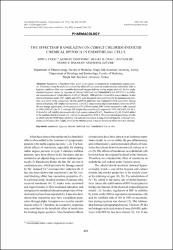THE EFFECTS OF RANOLAZINE ON COBALT CHLORIDE-INDUCED CHEMICAL HYPDXIA IN ENDOTHELIAL CELLS

Göster/
Tarih
2022Yazar
Çekiç, Edip GüvençYiğittürk, Gürkan
Önal, Melike
Elbe, Hülya
Başaran, Nesrin Filiz
Öztürk, Feral
Üst veri
Tüm öğe kaydını gösterKünye
Çekiç, Edip, Gürkan Yiğittürk, Melike Önal, Hülya Elbe, Nesrin Filiz Başaran, and Feral Öztürk. 2022. “The Effects of Ranolazine on Cobalt Chloride-induced Chemical Hypoxia in Endothelial Cells”. Acta Poloniae Pharmaceutica - Drug Research 79 (3). Acta Poloniae Pharmaceutica - Drug Research: 419–29. doi:10.32383/appdr/152437.Özet
Ranolazine is beneficial when given as an adjunct to treatment in symptomatic angina pectoris. Therefore, it may be useful to evaluate the effect of ranolazine on cardiovascular endothelial cells in hypoxic conditions that may resemble decreased oxygen delivery during angina pectoris. In this study, chemical hypoxia caused by exposure of Human Umbilical Vein Endothelial Cells (HUVECs) to different concentrations of cobalt chloride (CoCl2) (100 mu M - 1000 mu M) for 24 and 48 h was evaluated. In this chemical hypoxia model, HIF-lalpha and eNOS were measured semi-quantitatively by immunocytochemistry. Activation of the intracellular MAPK and PI3K pathways was evaluated by flow cytometry. During chemical hypoxia, HIF-lalpha was increased in a CoCl2 concentration-dependent manner; however, eNOS did not change significantly. In the presence of 10 mu M ranolazine, HIF-lalpha increased in cells exposed to 1000 mu M CoCl2 for 24 h, whereas HIF-lalpha decreased in cells exposed to 1000 mu M CoCl2 for 48 h. Endothelial cell viability decreased with a high concentration of CoCl2. Ranolazine (1 mu M, 10 mu M) added to the medium failed to restore cell viability as measured by WST-1. The proportional percentage of cells in which only the MAP kinase pathway was activated increased during chemical hypoxia. Although ranolazine could reduce HIF-lalpha levels in the 48hour group, it had no beneficial effect on CoCl2 toxicity.

















